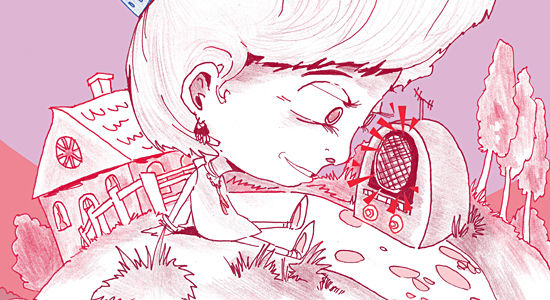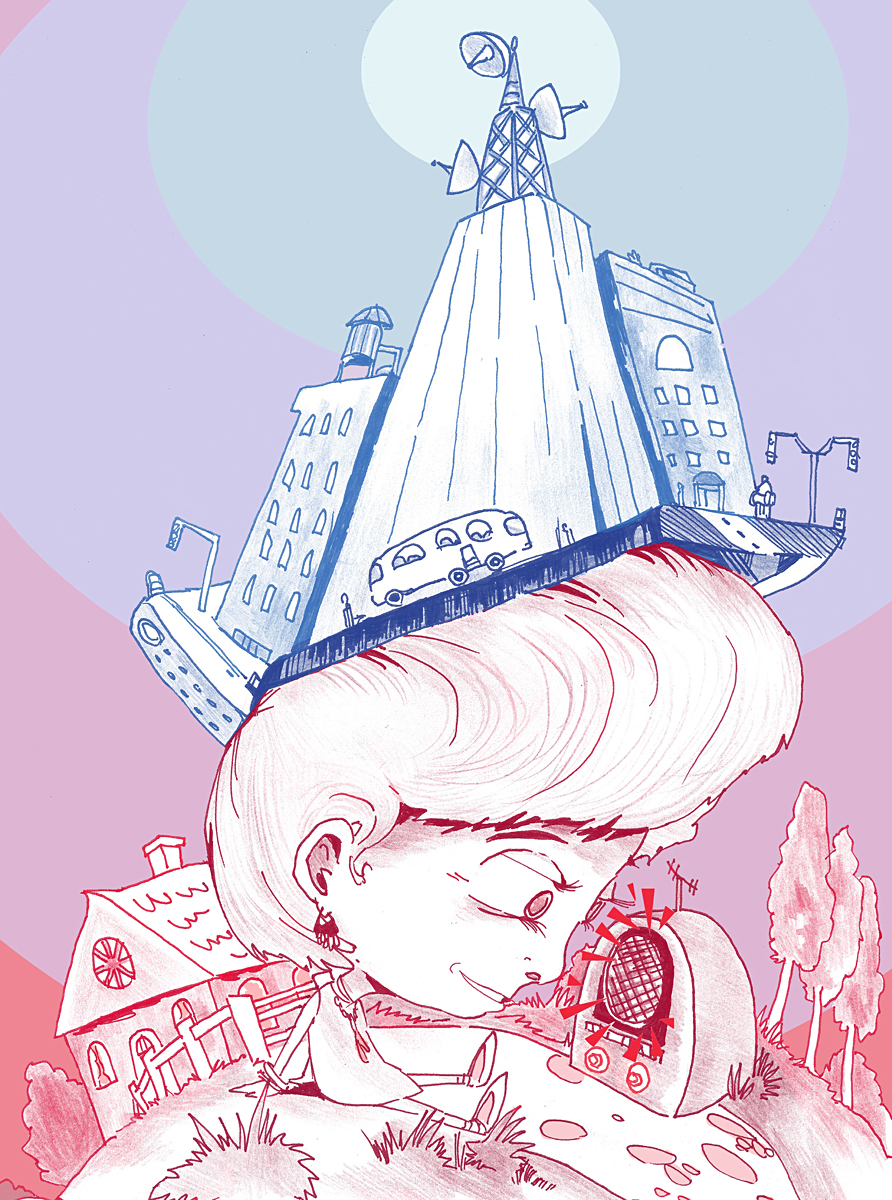Story by Brit McGinnis
Illustration by Aaron Sullivan
There is a feeling people have sometimes that can only be called distance. It’s a feeling that you are fundamentally different than the people around you. It’s not a good or a bad feeling, only difference. It cannot be helped. It is feeling as different as if you had a tail, or a different color pelt, or flippers, while the others of your species don’t have them. Someone could dye their pelt, strap down the tail, even cut away their flippers, but the difference still lingers.
Once upon a time in 2005, that was me. This was a time when it was still considered socially unacceptable to be different, when being a nerd or “strange” was a social death sentence. It wasn’t considered proper in my family to say that the books I most wanted to read were of the Best American Essay series. Practicing yoga was seen as bizarre. It was strange and antisocial to write. So I shut down, suppressing my quirks and retreating into the role I was to perform. I was the Dutiful Daughter of a large Irish-Anglo-American family, who would grow up to be a pediatrician. I would attend every football game at university, be married at twenty-five, and come home to visit every weekend. I put on a smile, said my lines, and waited for the happiness to come.
As what happens in every story worth recounting, conflict began to emerge between the characters. My Da, a longtime alcoholic, finally began to show symptoms of his problem. Incidents with police became more and more frequent. My three brothers and I were forced to take sides between our two parents, then with their families. Our family home, our cars, our very memories became labeled as “assets” to be divided. I would call home from university every week during that hellish freshman year, seeing who was in jail, who was in hiding, who was no longer talking to the family out of social shame.
By the time I went home for the summer after freshman year, I had acquired both claustrophobia and an eating disorder. Both plagued my existence, but temporarily subsided when I visited my grandmother for a week. She was the one who mailed me Feminist literature for Christmas, sweet-smelling pumpkin sachets for Halloween, ornate masquerade masks for no reason at all. It was this woman, my father’s mother and kindred spirit of mine, who introduced me to This American Life.
Life is a radio show. It is not news, it is not a call-in program, it’s barely a weekly broadcast of documentaries. It is people telling stories. This was unlike any radio program I had ever heard before; the host had a high, kindly voice, and wasn’t afraid to outright laugh at answers his interviewees gave. People said “um.” Contributors read aloud their own work, audibly becoming more happy or sad with the mood of their writing. The exact show I listened to first was number 306, titled “It Seemed Like a Good Idea At the Time.” There were stories about the American tour of Riverdance, people wrecking havoc on talk shows, bloody cow hearts. There was an air of curiosity about every and all subjects that I had never recognized in anything else before. I literally gazed at the radio, transfixed. Whatever this was, it was reaching out to me.
Slowly but surely, I began to untie my tail. Instead of the tee shirts and jeans I had always worn, I walked around in vintage dresses with sweater tights. I wrote essays, and was actually published. Opera, heavy metal, and classical music began to replace the popular music in my iTunes folder. And I became an avid devotee of This American Life, huffing the stories of strangers as if they were drugs. For the first time, I began to see a future where I could write, dance, and be loud yet accepted at the same time. This program explored the lives of people who were different too, ranging from men who bought their Christmas presents in June to children determined to be in every picture in their high school yearbook. They were all embraced by this storytelling program.
Then my father committed suicide. I was summoned home, to be with my family that winter. In their grief, they understandably plunged into their own, more mainstream culture for comfort. Yet I was not a member of their culture anymore, and so anything I truly loved to do was scrutinized. I had to watch movies like 12 and Who’s Afraid of Virginia Woolf? in bathrooms to avoid snide comments. Life was one of the works of art that carried me through, kept me connected to the outside world. I still remember number 374, “Somewhere Out There,” released exactly ten days after my father’s death. The story of an American traveling in China reminded me of my non-Caucasian friends, none of which my family had in our ninety-percent-Caucasian town. I listened in the handmade bed in the computer room, where I lived all summer because I had no room in the house my mother had received in the divorce. I listened to the story of two young transgender boys, told with empathy and seamlessly accompanied with music from An American Tail. Such care was taken to tell their story with respect, with polite inquisition as opposed to nosiness. This work of audio art reassured me that my desire to live differently didn’t make me wrong.
Entering my second year of college, the notion came to me that perhaps radio was the best way for me to tell the stories I wished to tell. I began to volunteer at the campus radio station, offering my services to stations in the city. I began reading about the actual people behind Life; I wanted to know who they were, to better know the background of their art. Many of them seemed to lead lives I wanted for myself, balances between domestic stability and unabated art-making. As any fan of an ongoing series will testify, this only enhanced my relationship to the show. Every time editor Sarah Vowell giggled on air, host Ira Glass asked an earnest question, or contributor David Rakoff said something in a way that implied his eyebrows were raised, I felt as if they were encouraging me. The staff was encouraging me to be truthful to who I was, by loving what they did. I poured through the Internet archives of the show, learning the styles and techniques of the people who were keeping me sane.
What struck me most during this time was one line of the June 14, 1996 show, number 26. Ira says at one point, probably off the script, “Dad, you are such a pro”. His father, a former radio announcer himself, was co-hosting the Father’s Day edition of the show that year. This episode had originally been broadcast when I was six years old, and I discovered it over the Internet. I could hear the pure admiration in Ira’s voice. Even though he’d likely never admit it in real life, there was an evident drive in him to impress his father through his radio work. I honestly think that on some level, he hopes he can be as good as his father was back in his prime. I know that my Dad would say that I was already there. I’ve been published. I haven’t been an addict since the age of nineteen. Ira was clearly amazed at how smoothly his father delivered the lines handed to him, just as I am still amazed by how much my father haunts my life after his death.
Most children eventually grow out of their compulsive, obsessive desire to know everything about everything around them. I never grew out of this tendency, and it isolated me for years. How relieving it was to find a groups of adults, professional wage-earners with passion for what they did, satisfying the curiosities of the masses with their art. When I alerted them of this essay’s existence, to the staff of Life (out of prudence, so they could give edits as they saw fit), this mutual curiosity showed itself. Two weeks later, I received a package from New York City. It contained an autographed picture of Ira, a DVD of their latest live show, and a handwritten note happily asking for a copy once the essay was finished. At the time, I couldn’t stop smiling at the sight of the words written in blue pen. How wonderful it was to know that the people of Life would still seek to encourage curiosity in life. The show would continue to be genuine, warm, and always on the prowl for people with tails.
Categories:
Sounds Of/For Life
December 3, 2010

Sounds Of/For Life
0








